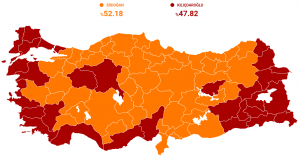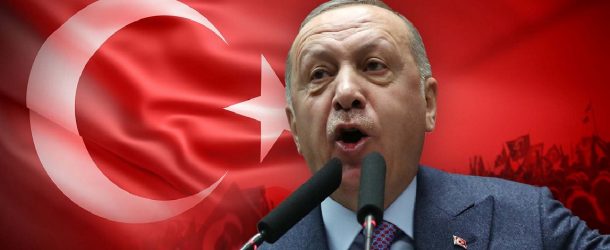Introduction
Turkish people went to ballots for the second round of the presidential election on May 28, 2023. The election took place in a peaceful atmosphere and in that sense it was a free and fair election. However, to be honest, conditions were not completely equal between two candidates as President Recep Tayyip Erdoğan and Islamist/conservative his party (AK Parti) used all state privileges against the opposition’s presidential candidate and pro-secular CHP leader Kemal Kılıçdaroğlu during the whole election process. This was observed best in the broadcasting policy of the state’s television channel TRT, which served as a propaganda machine and almost completely ignored the opposition while praising President Erdoğan at every instance. In the end, President Erdoğan won the second round with 52 % of the votes and gained another 5 years term in the office.
Prior to the Second Round
Before the second round of the election, both candidates tried to reach the voters of Turkish nationalist candidate Sinan Oğan, who unexpectedly had got more than 5 % of the votes in the first round. While President Erdoğan convinced Sinan Oğan himself and secured his support for the second round, CHP leader and the opposition’s presidential candidate Kemal Kılıçdaroğlu achieved to take the support of Professor Ümit Özdağ, the Chair of the Victory Party (Zafer Partisi), a small and new ultranationalist, anti-immigrant, and xenophobic party that was instrumental in the candidacy of Oğan. Kılıçdaroğlu and Özdağ even signed a protocol for deporting Syrian immigrants as soon as possible (within a year) and the continuation of AK Parti’s policies for the appointment of trustees (kayyum) to pro-Kurdish HDP-controlled municipalities. In addition, Kılıçdaroğlu and CHP increased the dose of populism and nationalism in their rhetoric as a response to President Erdoğan’s promotion of fake videos and exaggerated claims about the opposition’s links with the terrorist groups (mainly the PKK). While these policies might have garnered Kılıçdaroğlu a few extra points from the ultranationalist groups, it also caused the risk of losing Kurdish and leftist voters’ full support. Lastly, Kılıçdaroğlu participated into a 4 hours tv program on Babala Tv during which he showed a very good performance.
President Erdoğan on the other hand underlined the importance of his parliamentarian majority in his speeches and encouraged voters to choose him for a stable and harmonious government. Erdoğan seemed very confident of his victory especially after his unexpected high performance in the first round both in the parliamentary and presidential elections despite of the ongoing economic crisis and corruption scandals. Before the second round, although both sides increased the dose of Turkish nationalism and created an atmosphere of pressure to intimidate Kurds, pro-Kurdish HDP (Peoples’ Democratic Party) did not retreat and continued to endorse Kılıçdaroğlu with the hope of making transition into a fully democratic regime. However, many CHP voters as well as some Kurdish groups were disappointed from Kılıçdaroğlu’s anti-immigrant and ultranationalist rhetoric, which was not found suitable to a progressive social democratic party.
Results of the Second Round
In the second round, President Erdoğan’s number of total votes increased to 27.8 million from 27.1 million in the first round (approximately 700,000 increase). On the other hand, Kılıçdaroğlu’s votes rose to 25.5 million from 24.6 million (approximately 900,000 increase). The participation rate on the other hand decreased to 84 % in the second round from 87 % in the first round. In the end, Erdoğan won comfortably with more than 4 % difference.

Results of the second round
Source: NTV
However, Kılıçdaroğlu’s performance in the second round could be considered as partial success since in the first round he lost the parliamentarian majority to Erdoğan and his bloc by large difference, but was still able to protect and even slightly expand his electoral base in the second round. This shows the strength of the CHP and the Nation Alliance (Millet İttifakı) and the loyalty of their supporters. In that sense, Kılıçdaroğlu’s strategy of establishing an alliance with right-wing parties worked and provided a real chance for the opposition to win the executive power first time after 21 years. Moreover, 2.5 million vote difference between two candidates in the first round in fact fell to approximately 2.3 million in the second round. However, in the end, both parliamentary and presidential elections were lost and this would not make people from the opposition very happy.

Electoral map
Source: NTV
Lastly, it should be also stated that Sinan Oğan’s votes in the first round were shared between both candidates, but they seem to be headed more for Kılıçdaroğlu rather than Erdoğan. In that sense, Kılıçdaroğlu’s alliance strategy with Ümit Özdağ and Victory Party also did not backfire, but did not change the overall picture as well.
What to expect?
After reaching this miraculous victory in extremely difficult conditions after the terrible earthquake in February 2023 and the deepening economic crisis, it seems like there is no barrier left in front of President Erdoğan to shape the future of his country freely as he wishes. In my opinion, President Erdoğan will now make bolder steps to transform Türkiye into a regional power by increasing the dose of nationalism and militarism. Leaning on developing national defense industry, Turkish President could defend Türkiye’s interests in a stricter manner in the new term by adopting harsher stances in the Eastern Mediterranean, Cyprus, the Aegean, and Syria. Results might also encourage Erdoğan to continue with his neutrality policy towards the Russian invasion of Ukraine while trying to form better relations with the West as well.
However, from my perspective, as long as President Joe Biden stays in the Oval Office, it might be almost impossible for Erdoğan to straighten out things with Washington. In that sense, Erdoğan, together with Russian leader Vladimir Putin, will do everything to get Donald Trump elected in the U.S. presidential elections in 2024. In the meantime, President Erdoğan might also try to redesign the opposition in Türkiye as well by using his full control over the state mechanism. Especially legal restrictions on pro-Kurdish organizations and groups could increase and the dose of Islamism, misogynism, and patriarchalism might reach all time high level with the effect of some radical groups who contributed to Erdoğan’s victory including Fatih Erbakan’s New Welfare Party (Yeniden Refah Partisi) and Islamist and pro-Kurdish Hüda-Par.
Conclusion
To conclude, 2023 Turkish elections were very exciting, but contrary to the popular belief and public opinion polls made prior to the first round, President Erdoğan and his bloc showed a great success and clinched another victory in a relatively easier manner. Erdoğan’s success lies in the fact that he is a man of the people with all his improper and exaggerated speeches, behaviors, and gestures and he knows how to grasp power better than anyone in the country. In that sense, President Erdoğan is a great populist right-wing politician, but not a very promising liberal democrat. Finally, Türkiye’s economic problems will persist and make the regime fragile unless President Erdoğan changes his approach to economics and liberalize the regime.
Assoc. Prof. Ozan ÖRMECİ

























































